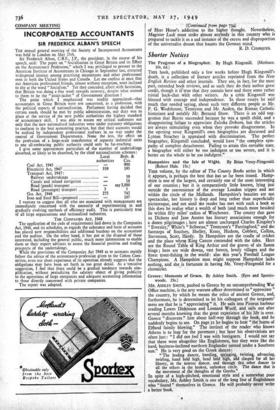MR. ASHLEY SMITH, pushed to Greece by an uncomprehending War
Office machine, is the arty warrant officer determined to " appreciate " the country, by which he means the relics of ancient Greece, and, furthermore, he is determined to let his colleagues of the sergeants' mess see that he is " appreciating " it. He sails into Piraeus harbour reading Lowes Dickinson and Leonard Woolf, and sails out after several months knowing that the great experience of his life is over. Greece " discovers " him about half-way through the book, and he suddenly begins to see. On page 21 he begins to hear " the horns of Elfland faintly blowing." The instinct of the reader who knows Athens is to leap for the pavement ; but later his observations are often just : " I did not feel I was with foreigners. I would not say that these were altogether like Englishmen, but they were like the hard, business-inclined northern Englander tanned under a Southern sun." He is very good on the Greek dances: " The leading dancer, kneeling, springing, twisting, advancing, twirling, hand held high, head held high, add clasped for all her liberty, to the nearest dancer, and through this other dancer to all the others in the broken, unbroken circle. The dance that is the movement of the thoughts of the Greeks."
In spite of a high-pitched, emotional style and a somewhat poor vocabulary, Mr. Ashley Smith is one of the long line of Englishmen who " found " themselves in Greece. He will probably never write a better book.






































 Previous page
Previous page